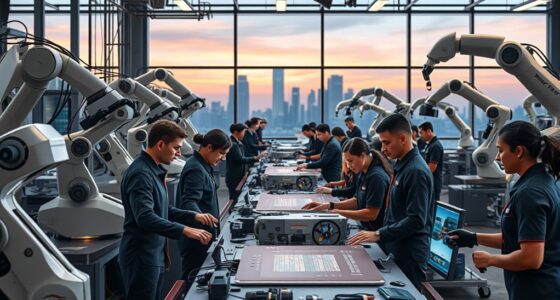Jobs that rely on emotional intelligence, creativity, and complex judgment are hard for tech to replace. Roles like healthcare providers, educators, counselors, and artists depend on understanding feelings, building trust, and personal connection — areas AI can’t fully mimic. Strong interpersonal skills, active listening, and cultural awareness set humans apart in social and nuanced situations. If you want to explore how these qualities shape future careers and where technology still falls short, keep exploring.
Key Takeaways
- Jobs requiring emotional intelligence, empathy, and personal connection, such as healthcare and counseling, cannot be fully replaced by AI.
- Creative roles that rely on originality, human judgment, and cultural nuance remain resistant to automation.
- Complex social skills like negotiation, conflict resolution, and interpreting subtle cues are beyond AI’s current capabilities.
- Building authentic trust and understanding through nonverbal cues and emotional nuance is a uniquely human strength.
- Professions centered on human expression, art, and personal storytelling continue to depend on human ingenuity and emotional depth.
Professions Requiring Emotional Intelligence and Empathy

Professions that demand emotional intelligence and empathy play a crucial role in fostering meaningful human connections. As a customer experience specialist, your ability to understand and personalize interactions keeps clients satisfied and loyal. If you’re an educator or teacher, managing student emotions helps create a supportive learning environment. Healthcare providers rely on empathy to comfort and support patients through difficult times. Leaders and managers with high emotional intelligence foster trust, improve team engagement, and retain talent. Mental health professionals use their emotional awareness to guide effective therapy. These roles require more than technical skills—they demand genuine understanding and compassion. In a world increasingly driven by automation, your capacity to connect emotionally remains irreplaceable, making these professions essential for human-centered work. Studies show that jobs emphasizing emotional intelligence are less susceptible to automation and AI replacement. Additionally, maintaining emotional awareness enables professionals to adapt to diverse situations and respond appropriately, reinforcing the importance of interpersonal skills in the workforce.
The Role of Creativity and Originality in the Workforce

As the workforce evolves, creativity and originality become essential drivers of innovation and competitive advantage. Currently, most companies remain risk-averse, with only 13% embracing a risk-friendly mindset, yet risk-taking brands generate four times higher profit margins. Confidence in bold creativity is waning, impacting business growth, but creativity is shifting from purpose-driven to joyful and dynamic forms. Gen Z, with 63% engaging daily in creative activities, leads this change, influencing workforce dynamics alongside Millennials, who will comprise 75% of the global workforce by 2025. California exemplifies creative resilience, dominating the creative economy with high-paying jobs in film, TV, and new media. Overall, fostering creativity and originality remains crucial, as these skills fuel innovation and ensure organizations stay competitive amid evolving trends. According to the latest State of Creativity 2025 report, fostering a culture that encourages creative risk-taking is vital for future success. Additionally, integrating electric bikes into urban commuting strategies can promote sustainable and healthy transportation options, aligning with the broader shift towards innovative mobility solutions. Recognizing the importance of creative risk can help organizations adapt and thrive in competitive markets, especially as they seek to maximize innovation. Embracing diverse creative talents can further strengthen organizational resilience and adaptability in an ever-changing landscape.
Interpersonal Skills That AI Cannot Mimic

You can’t rely on AI to truly understand or express complex human emotions, which are essential for building trust and rapport. Nuance and context in conversations often escape AI’s grasp, leading to misunderstandings or flat responses. These subtle skills are what make genuine interpersonal connections possible, and AI just can’t replicate them. Research shows that 80% of survey respondents believe soft skills are more important than ever with AI’s rise.
Empathy and Emotional Connection
While AI can analyze emotional cues and generate supportive responses, it fundamentally lacks genuine empathy. AI relies on algorithms to mimic emotional understanding, but it doesn’t truly feel or comprehend emotions like humans do. Because of this, people often feel less connected or heard when interactions come from AI, revealing a bias against machine-generated empathy. AI can recognize language patterns and behavioral data to craft responses that seem empathetic, and it can scale emotional support efficiently. However, it struggles with understanding subtle emotional cues, nonverbal signals, and the depth of human feelings. Authentic connections require trust and genuine understanding—things AI can’t fully replicate. For example, the effectiveness of human connection relies heavily on nonverbal communication and emotional nuance that AI cannot genuinely grasp. Additionally, genuine empathy involves trust and authenticity, which are inherently human qualities that machines cannot authentically embody. The nuance of human emotion plays a critical role in building trust and rapport, further emphasizing why AI cannot replace human empathy. Furthermore, the complexity of human feelings adds an additional layer that AI systems are not yet capable of fully understanding or responding to. As a result, human empathy remains irreplaceable in building meaningful, lasting relationships.
Nuance and Context Understanding
Empathy and emotional connection are indispensable for meaningful interactions, but understanding subtlety and context in communication goes even deeper. AI struggles to grasp the nuances and underlying meaning behind human language, often missing important cues. Its ability to interpret context depends heavily on the quality of training data, which can be biased or limited. Without common sense, AI can misinterpret complex situations or cultural nuances. To give you a clearer picture:
- AI has difficulty recognizing humor, irony, or sarcasm.
- It struggles with relational dynamics and cultural differences.
- Multimodal understanding—integrating visual and auditory cues—is a significant challenge.
- Automated data collection often lacks the depth needed to fully capture human social and emotional cues.
- Developing Cultural Intelligence can help bridge these gaps by fostering a deeper understanding of diverse social norms and communication styles, which AI currently cannot replicate effectively.
- Additionally, interpersonal skills such as negotiation and conflict resolution remain uniquely human capabilities vital for nuanced social interactions.
- Recognizing and responding to subtle emotional cues is another area where AI falls short, highlighting the importance of human empathy in complex social exchanges.
- The ability to adapt to dynamic social environments and interpret unspoken agreements plays a crucial role in effective communication that AI has yet to master.
- Furthermore, the integration of emotional intelligence in AI systems is still in its infancy, emphasizing the ongoing need for human oversight to interpret complex emotional contexts accurately.
Because of these limitations, human oversight remains crucial to ensure that AI interprets context accurately and responds appropriately in social and complex scenarios.
Complex Problem-Solving and Human Judgment

Human judgment remains essential in complex problem-solving because it enables nuanced decisions that AI systems currently cannot replicate. You rely on contextual understanding to grasp intricate situations, something AI often misses. Emotional intelligence helps you consider how choices affect others, ensuring empathy guides decisions. Creativity allows you to generate innovative solutions beyond algorithms, while ethical judgment keeps actions aligned with societal values. Your adaptability lets you respond to unexpected changes effectively. Additionally, critical thinking is vital for evaluating information and making sound decisions that machines cannot easily emulate. Recognizing the importance of human oversight ensures that technology serves human needs responsibly. Developing mindfulness can further enhance your decision-making by increasing awareness and clarity, allowing for more focused and deliberate responses. Incorporating emotional regulation techniques can help maintain balance and calmness under pressure, improving overall judgment. Here’s how your skills compare:
The Significance of Communication and Active Listening

Effective communication is the foundation of strong workplace relationships and successful teamwork. When you master active listening, you can prevent misunderstandings and foster trust. Employers recognize this, emphasizing verbal skills, presentation, and especially active listening, which improves collaboration by up to 25%. Incorporating engaging and vibrant techniques, such as colorful presentation, can make your communication more effective and appealing. Additionally, understanding the social determinants of health can help tailor communication strategies to diverse audiences, fostering inclusivity and understanding. Recognizing the role of essential oils in promoting health and well-being can also enhance workplace wellness initiatives, leading to a more positive environment. Being aware of gelato flavors and the sensory experiences they provide can also serve as a tool for engaging conversations and building rapport among colleagues.
By honing active listening, you can:
- Build stronger connections through empathy and respect
- Reduce workplace conflicts by up to 80%
- Boost team cohesion, making everyone feel valued
Active listening also enhances leadership effectiveness and employee satisfaction. When you truly listen, you show genuine interest, create a positive environment, and encourage open dialogue. Recognizing the importance of auditory processing can further improve communication, especially for individuals with specific listening challenges. These skills aren’t just nice to have—they’re essential for creating a productive, harmonious work atmosphere.
Careers Dependent on Human Interaction and Personal Connection

Careers that rely on personal connection and human interaction remain resilient because they depend on qualities machines can’t replicate—such as genuine understanding, emotional insight, and adaptability. Social workers, counselors, and teachers excel because they require empathy and the ability to respond to unique human needs. Healthcare professionals like nurses and doctors rely on compassion and complex decision-making that go beyond algorithms. Roles in sales, marketing, and human resources involve building trust and understanding customer or employee emotions. Professions like arbitration, mediation, and leadership demand human judgment and emotional intelligence. Creativity-driven careers such as art, music, and writing depend on originality and human expression. Additionally, knowing the hours of operation for various restaurants can be crucial for planning outings and ensuring timely visits, especially during holidays or special events. These jobs thrive on personal connection, making them less vulnerable to automation and artificial intelligence. Recognizing the importance of emotional intelligence in these fields highlights why human touch remains irreplaceable.
The Impact of AI on Entry-Level Opportunities and Career Development

AI is changing entry-level jobs by automating tasks and reducing available roles, which makes it harder for newcomers to find opportunities. As automation grows, salary expectations may decrease, and competition from global markets increases. To stay competitive, you’ll need to develop AI-related skills and adapt quickly to this evolving landscape.
AI and Entry-Level Jobs
Have you ever wondered how technological advances are reshaping entry-level job opportunities? AI is transforming the job landscape, often reducing roles that rely on repetitive tasks. You might notice:
- Job reductions: About 40% of employers plan to cut entry-level positions where AI automates tasks.
- Automation anxiety: Nearly 50 million US jobs, including many entry-level roles, could be impacted.
- Skills accessibility: AI makes roles with specialized skills more accessible, potentially lowering entry-level opportunities.
This shift leads to a talent pipeline problem, affecting social mobility. Remaining entry-level jobs may offer lower salaries as AI-supported roles become the norm. While AI creates new opportunities, the landscape is changing, and adapting early is key for your career resilience.
Career Growth Challenges
As automation continues to reshape entry-level roles, understanding how these changes impact your career growth becomes more important than ever. AI’s rise may reduce workforce needs by up to 40%, displacing 9 million jobs but creating 11 million new ones. Skills can become obsolete quickly, especially as AI lowers the value of specialized education. Additionally, regional competition from outsourcing and talent hubs intensifies, making it harder to stand out. To adapt, developing hybrid skills—combining technical expertise with strategic thinking—is essential. Earning specialized certifications and gaining real-world AI experience can give you a competitive edge. The table below highlights key factors influencing your career growth:
| Factor | Impact | Strategy |
|---|---|---|
| Job Displacement | Fewer entry-level roles | Upskill continuously |
| Regional Competition | Increased global talent pool | Focus on unique skills |
| Skill Obsolescence | Rapidly changing tech landscape | Embrace lifelong learning |
| Salary Expectations | Lower entry-level wages | Develop niche expertise |
Future Trends in Human-AI Collaboration and Job Innovation

Emerging trends indicate that human-AI collaboration will reshape the workplace by fostering more flexible and innovative job structures. You’ll see AI automating routine tasks, freeing you to focus on creativity and strategic thinking. Hybrid teams, combining human judgment and AI efficiency, will boost productivity, while AI-driven talent management matches skills to projects seamlessly. Remote work becomes more feasible with AI tools, enabling global collaboration across time zones. Expect organizational models to evolve into fluid, adaptable structures, with AI handling coordination and humans providing leadership. New roles in AI development, training, and maintenance will emerge. You’ll need to adapt quickly, honing interpersonal skills and emotional intelligence to thrive in this evolving landscape. Ultimately, leveraging both human ingenuity and AI will define future job innovation.
Frequently Asked Questions
How Will AI Influence Emotional Intelligence in Future Workplaces?
You might wonder how AI will shape emotional intelligence in workplaces. As AI integrates further, it supports your ability to understand and respond to others’ emotions by analyzing communication patterns and providing real-time insights. This helps you build trust, resolve conflicts, and foster strong relationships. While AI handles data-driven tasks, your emotional skills remain essential for effective leadership, teamwork, and creating a positive work environment.
Can AI Ever Truly Replicate Human Creativity and Artistic Expression?
Oh, sure, AI might someday craft poetry that tugs at your heartstrings or paint masterpieces that stir the soul—if only it could feel a single emotion itself. While AI excels at churning out ideas and mimicking styles, it lacks the spark of genuine intuition, empathy, and cultural nuance that make human creativity so irreplaceable. So, no, AI won’t truly replicate the depth of human artistic expression—yet.
What Roles Will Require Nuanced Human Interpersonal Skills in the Future?
You’ll find that roles demanding nuanced human interpersonal skills, like mental health therapists, relationship managers, educators, and healthcare providers, will remain crucial. These jobs require emotional intelligence, empathy, and adaptive communication—skills AI can’t fully replicate. As technology advances, your ability to build trust, interpret subtle emotional cues, and respond with genuine understanding will keep these professions resilient and essential for the foreseeable future.
How Does Human Judgment Enhance Complex Decision-Making Processes?
You might find that around 75% of complex decisions benefit from human judgment. It enhances decision-making by adding context, emotional insight, and experience that data alone can’t provide. Your ability to interpret nuanced situations, assess risks, and incorporate ethical considerations guarantees more well-rounded outcomes. By trusting your judgment, you adapt to changing environments, challenge norms, and make strategic choices that align with broader goals and societal needs.
Will Active Listening Skills Become More Valuable With AI Integration?
You might wonder if active listening will become more valuable as AI integrates into workplaces. The answer is yes. As AI handles routine tasks, your ability to listen actively becomes essential for understanding nuanced human emotions, building trust, and making ethical decisions. Your empathy and communication skills will help bridge gaps between technology and human needs, making you an indispensable part of teams and leadership in an AI-enhanced environment.
Conclusion
While AI transforms many jobs, your ability to connect emotionally, think creatively, and communicate effectively remains irreplaceable. Studies show that 78% of employers value emotional intelligence over technical skills, highlighting your unique human qualities. Embrace these strengths as AI advances, because your empathy and judgment will always set you apart. The future isn’t just about machines—it’s about how you leverage your human touch to innovate and thrive alongside technology.









